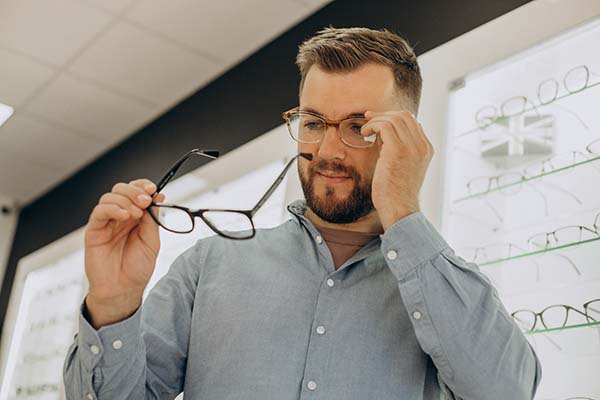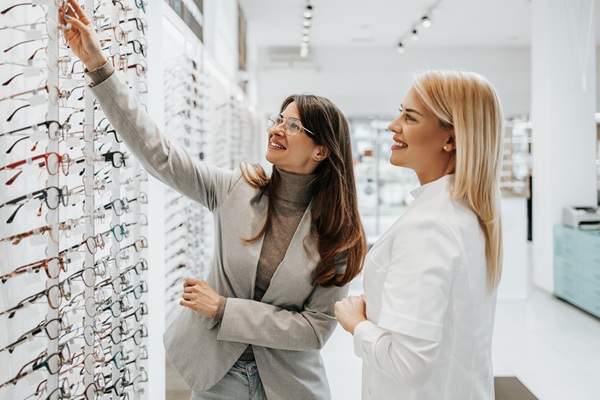Benefits of Transition Lenses

When it comes to using sunglasses or eyeglasses, it can be difficult to find ones that work in any light unless you decide to opt for transition lenses. Unlike traditional lenses that serve one singular purpose, transition style lenses have a number of uses and benefits beyond just enhancing vision or serving as sun protection. To help you decide if these lenses are the right kind for you, we’re going to talk in this post about some of the benefits and uses of lenses that transition.
What is a transition lens?
If you haven’t tried glasses that use transition lenses yet, then you may be unfamiliar with exactly what they are. A transition lens is also called a photochromic lens and is made with special chemicals that react based on how much light they are exposed to. This makes them altogether different in composition from both glass and plastic lenses and functionality in terms of what they can do for you when you wear them.
It is now possible to get lenses that transition for both your eyeglasses and sunglasses and most folks only have one pair of glasses now that can function for both needs.
The lenses work to remain clear while indoors, allowing them to be used for reading and other day-to-day tasks without obstruction or darkening. When subjected to sunlight, the chemicals in the lenses allow them to transition to a darker shade in order to block and filter out sunlight and UV rays. Typically the lenses have gradual levels of darkening depending on the light exposure that allow them to go from clear to varying shades darker all the way to full sunglasses.
Benefits of transition lenses
If you’re thinking of switching lens types, here are some of the benefits of transitional lenses.
Better overall eye protection
Because they adjust to the light, transition style lenses offer a better layer of protection against UV ray exposure and just overall light exposure as opposed to traditional lenses. Our eyes can get strained and damaged if they are exposed to bright light without protection. Whether it be overly bright indoor lighting or sunlight, transitional style lenses help to shield our eyes and lessen the potential exposure and damage from bright and ultraviolet light sources.
More functionality
One of the most frustrating things about needing prescription glasses of any kind is needing multiple pairs for different situations. Reading glasses don’t usually offer any sun protection, and sunglasses don’t offer the ability to read or improve your ability to see. It can get very pricey to have multiple pairs of glasses or have them custom-made to drive in direct sunlight or read under different lighting.
By opting for lenses that transition, you have a middle ground between eyeglasses and sunglasses that lets you get more versatility and functionality out of one pair of glasses that you would normally need at least two or more to get. This is a great way to save money, but in terms of your eyesight, it makes you much more adaptable to different situations.
Better vision in general
Another benefit of the transition lens is that you can actually improve how well you see with your glasses because the lens helps you in different situations. Your eyes can suffer strain just from switching from one type of light source to another, and glare can reduce your ability to see even with corrective lenses.
Transitional lenses offer you the ability to avoid these problems because they reduce or eliminate glare, and they shift with the light you’re in, so you never have to squint or strain to try and see in the sunlight or take off your sunglasses because you walked indoors. You can essentially take one pair of glasses with you and use them to read, drive, and do all the things you need to do without worrying about the damage that you’re doing to your eyes.
Easier customization
Lastly, a thing to think about when choosing your next pair of glasses is whether or not the lenses you choose will be suited to the things you do most. While transition style lenses aren’t perfect, they offer the ability to adjust to your lifestyle better than spending large amounts of money on multiple pairs of glasses that you run the risk of breaking or losing.
Reach out to your optometrist
If you're thinking of transition lenses, it's likely that you have a lot of questions on your mind. As always, before you make your next decision, consult with your optometrist about what lenses are right for you. They can help walk you through the process of choosing what is right for your situation.
Request an appointment here: https://www.texasoptical.net or call Texas Optical at (214) 771-7333 for an appointment in our Dallas office.
Check out what others are saying about our services on Yelp: Transition Lenses in Dallas, TX.
Recent Posts
Prescription contacts provide vision correction, comfort, and convenience for those who do not want to wear glasses. However, caring for and wearing contacts takes some getting used to. Learning to insert, remove, and maintain them will help ensure a comfortable and safe experience.Not all contact lenses are the same, and choosing the right pair is…
If you are thinking about seeing an optometrist, you should first look at your options. When you understand what this doctor does, you can make the right choice for your eye health. Other medical professionals help patients with their eyes too. So, it is important that you get the relief and treatment you need.People depend…
With digital screens occupying the majority of our lives, concerns about eye strain and potential long-term effects have increased the popularity of blue light glasses. Many individuals who spend extended hours in front of screens in their personal and professional lives seek practical solutions to alleviate symptoms associated with prolonged exposure to artificial lighting. Fortunately,…
Visiting an optometrist for a vision test is an important first step in protecting one of your most valuable assets —your eyesight. A professional assessment is key whether you are concerned about changes in your eyesight or addressing potential eye health issues. Discover the many benefits of scheduling a vision test and how it can…


